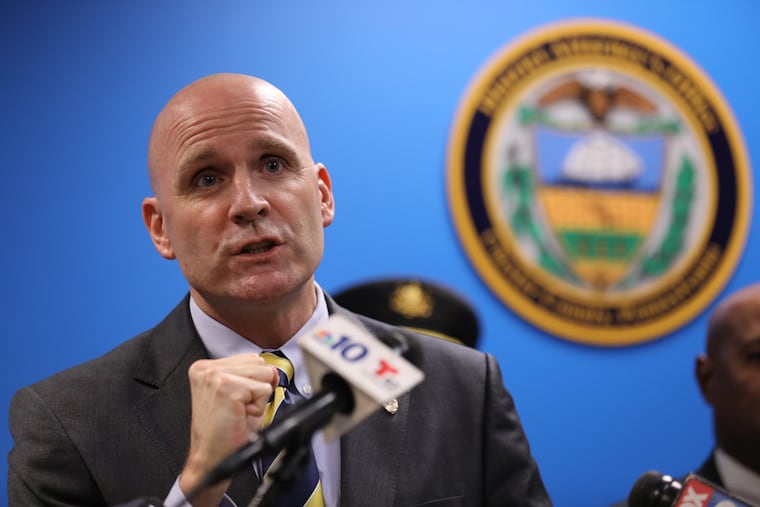Pa. State Police union sues Chester County DA over list of cops to keep off stand
In a lawsuit filed last month,

In a scathing memo to the commanding officer of the Pennsylvania State Police, Chester County District Attorney Thomas P. Hogan sharply criticized the actions of several troopers during a police-involved shooting in London Grove Township this summer, writing that some of their errors could have caused "serious ramifications" had the suspect been killed.
"If this case proceeded to trial regarding the shooting incident, any decent defense lawyer would significantly damage the strength of the case and the reputation of [the state police] by flaunting these errors to a jury," Hogan wrote to Lt. Col. Robert Evanchick and other officials on July 26. "Such errors cannot be permitted."
That memo, intended to remain confidential, also revealed that Hogan – much like his counterpart in Philadelphia – maintains a list of law enforcement officers that his office blocks from testifying in court. One of the troopers mentioned in the memo, Lt. Brandon J. Daniels, is on the list, which also includes two other "current or former" state troopers, Hogan wrote.
The list, and the memo that revealed its existence, are the subject of a lawsuit by Daniels and the Pennsylvania State Troopers Association, the union representing the 4,000-member force. That suit, filed by Sean Welby, the Harrisburg attorney representing the union, made the memo public. Welby had filed a motion to keep the civil complaint sealed but withdrew it last week, court records show.
"Every criminal prosecution is built on the integrity of law enforcement officers," Hogan said Tuesday in response to the lawsuit. "District attorneys have the duty to make sure that only credible officers are presented to testify. Luckily for Chester County, our police are generally of the highest professional ability and moral character."
Michael Pullano, the attorney for Hogan, said Tuesday that state law grants district attorneys the license to choose whether to call witnesses in a criminal case and gives them discretion to weigh the credibility of those prospective witnesses.
"It is unclear how the union believes in good faith it can force the district attorney to use someone at trial as a witness when the district attorney believes that person to be incredible," he added.
Welby did not respond to a request for comment Tuesday. David Kennedy, the president of the troopers association, declined comment "out of respect for all parties involved."
In the complaint, Welby dismisses allegations that Daniels, the on-scene commander, mishandled the investigation of the May 23 shooting. He also derides prosecutors for keeping the list, and said its "partial publication" in the memo was "inherently damaging to the reputation of both Daniels and all members" of the state police working in Chester County.
"Nor are there any apparent standards for being placed on the list other than the arbitrary and capricious whim of District Attorney Hogan," Welby wrote.
Philadelphia District Attorney Larry Krasner received wide attention earlier this year when the Inquirer and Daily News reported that he kept a similar list of 29 city police officers whose testimony he would not permit in court because of questions about their credibility or past behavior. The list includes detectives and officers either dismissed or suspended by the department for violating its standards.
The incident at the center of the dispute in Chester County occurred when Brian Touchton, 41, led three state police vehicles on a prolonged chase through rural areas. At one point, the pursuit paused in a parking lot for Nutra-Soils Inc., a supply company catering to the mushroom industry. There, three of the troopers fired their weapons. No bullets hit Touchton, who fled for a short distance before his vehicle got entangled in underbrush.
Hogan, in a news release issued weeks after the shooting and on the same day as the internal memo was dated, said his office had reviewed the incident and "concluded that no charges will be filed against the troopers." Touchton, meanwhile, was charged with DUI, reckless endangerment, and related offenses. He is being held in the county jail awaiting a Nov. 5 trial.
That public posture aside, Hogan was critical of the handling of the shooting in the memo he privately sent to Evanchick; Capt. James Fisher, the commander of the barracks from which the troopers were dispatched; and Marcus L. Brown, the state's director of homeland security.
Chief among Hogan's complaints was that Daniels did not report the shooting to his office – the independent agency assigned to investigate police-involved shootings – for four hours. Daniels later explained the delay by saying he "had other things to do" and did not have Hogan's mobile phone number.
Those explanations, Hogan wrote, "are not credible." He suggested that Daniels wanted the state police to conduct its own review of the shooting and "evade an independent investigation."
Hogan's investigation found that security at the crime scene was "an abysmal failure." At one point during the investigation, a tractor-trailer was driven into the parking lot where the shooting took place and logs showing who had entered the area had been "materially altered" after the prosecutor's office began its probe, according to the memo.
Hogan also criticized the union's actions after the shooting. He said a union representative failed to separate the three troopers who fired their guns, transporting them from the scene in the same vehicle. This violated policy, Hogan wrote, and left open the possibility that a skilled defense lawyer could argue that the union representative "coached and colluded with" the troopers to fabricate a narrative that might exonerate them.
Ultimately, Hogan wrote that only one of the three troopers who fired his weapon was justified in doing so, believing – albeit mistakenly – that Touchton had shot at his fellow troopers in the parking lot.
"If the troopers had inadvertently shot and killed the suspect," Hogan wrote, "… they almost certainly would have faced homicide and/or manslaughter charges under the specific circumstances of the case."